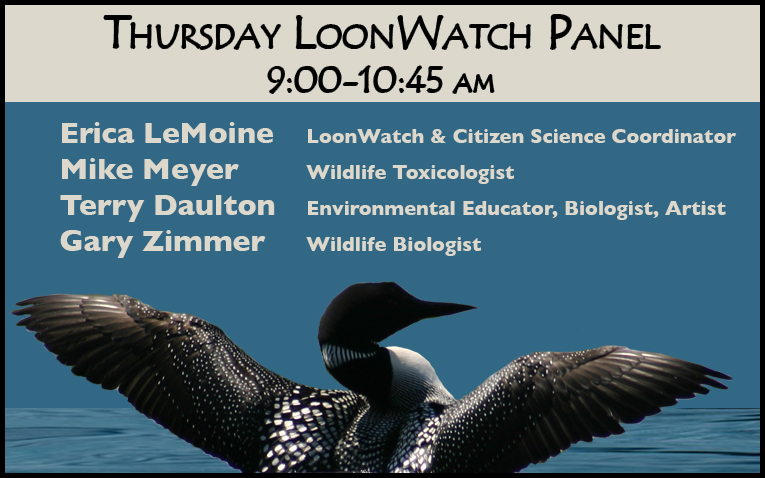 In the winter 1978 issue of UW-Extension Lakes’ quarterly newsletter,
Lake Tides, Tom Sinclair and Stan Temple from UW-Madison discussed the myriad threats facing Wisconsin’s iconic loons. That summer, Gary Chowlek posted an item in the subsequent
Lake Tides to solicit volunteers to participate in “Project Loon Watch” at Northland College. Thus began four decades (and counting!) of formally organized citizen science around loons and their habits on Wisconsin lakes. This panel will review the history of the LoonWatch program and highlight scientific discoveries about loons made possible with citizen data. We will also look forward to the future of this beautiful water bird as its population expands and new challenges emerge. We hope you enjoy the digital production we have prepared to kick off this celebration.
Click here to view the digital production on our YouTube channel.
In the winter 1978 issue of UW-Extension Lakes’ quarterly newsletter,
Lake Tides, Tom Sinclair and Stan Temple from UW-Madison discussed the myriad threats facing Wisconsin’s iconic loons. That summer, Gary Chowlek posted an item in the subsequent
Lake Tides to solicit volunteers to participate in “Project Loon Watch” at Northland College. Thus began four decades (and counting!) of formally organized citizen science around loons and their habits on Wisconsin lakes. This panel will review the history of the LoonWatch program and highlight scientific discoveries about loons made possible with citizen data. We will also look forward to the future of this beautiful water bird as its population expands and new challenges emerge. We hope you enjoy the digital production we have prepared to kick off this celebration.
Click here to view the digital production on our YouTube channel.
Panel:
Erica LeMoine is the LoonWatch and Citizen Science Coordinator at Northland College in Ashland, Wisconsin. She conducts Loon Ranger trainings across the state and plans and implements the Annual Lakes Monitoring Program and a statewide five-year census of loons. She also implements the Loon Appreciation Week poster, Speakers’ Bureau program, Get the Lead Out program, and the Sigurd T. Olson Loon Research Award.
Michael Meyer is a retired wildlife toxicologist with the Wisconsin DNR. His work focused on wildlife contaminants, inland lakeshore management, and climate change. While studying the effects of mercury on loons in Wisconsin, Mike and colleagues banded and sampled over 3000 loons in northern Wisconsin, as well as coordinating a citizen science research project focused on loon reproduction in the Northern Highlands. In retirement, Mike is continuing to conduct research and outreach through his firm, NOVA Ecological Services.
Terry Daulton is an environmental educator, consulting biologist and artist who served as the LoonWatch coordinator at Northland College from 1989-1997. She studied loons as a field biologist from 1998-2004 for the Wisconsin DNR and the US Geological Survey. She developed the Drawing Water program at UW Trout Lake Research Station, a collaboration between artists and scientists and currently coordinates that program as a volunteer. She also serves as Board President for Wisconsin’s Green Fire, a non-profit organization of Wisconsin conservation scientists. During graduate school, Terry studied under Lowell Klessig and edited the
Lake Tides newsletter, so the Wisconsin Lakes Convention is always like a homecoming for her.
Gary Zimmer is the Assistant Executive Director of the Wisconsin County Forests Association and currently serves on the Wisconsin Natural Resources Board. Gary was a graduate student of Dr. Ray Anderson at UW Stevens Point and conducted the first statewide assessment of loons in Wisconsin in 1977 and 1978. After completing his thesis in 1979, Gary became a member of the Project LoonWatch advisory committee. In his career Gary worked for the Wisconsin DNR conducting waterfowl research on the Horicon and Grand River Marsh Wildlife Areas, was a District wildlife biologist on the Lakewood/Laona District of the Chequamegon/Nicolet National Forest and was the Coordinating Biologist for the Ruffed Grouse Society covering the Western Great Lakes Region. He has lived in Northern Wisconsin’s loon country for over 50 years.
